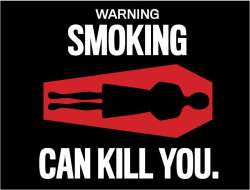Graphic warnings can quash cigarettes' appeal to kids
They found that the graphic warning label drew viewers' attention away from ads and toward the warning, regardless of whether the warning was graphic or text only, more than the current surgeon general warning.

Cigarette ads with graphic warning labels that contain images such as bleeding, cancerous gums and lips can snuff out children's view of smoking tobacco as cool, rebellious and fun, suggested a new research. These labels have the same anti-smoking effect as similar warning labels on cigarette packs.
"This study suggests the value of graphic warning labels extends beyond just getting people to have more negative feeling about smoking," said lead author Jeff Niederdeppe, Associate Professor at the Cornell University.
"It also seems to have the added benefit of reducing the influence of 'social cue' ads that entice young people to want to smoke in the first place," Niederdeppe added.
For the study, appearing in the journal Health Education Research, the team studied the graphic warning labels' effect on 451 adult smokers and 474 middle schoolers in rural and urban low-income communities.
Each participant was randomly assigned a set of six ads. Some saw ads with social cues -- such as a group of smiling people taking a selfie with a graphic warning label covering 20 per cent of the ad. Other groups saw ads with various combinations of text-only warnings, graphic warnings, the current surgeon general warning, brand imagery and social cues.
They found that the graphic warning label drew viewers' attention away from ads and toward the warning, regardless of whether the warning was graphic or text only, more than the current surgeon general warning.
The labels also aroused more negative feelings than the text-only labels and reduced the children's perceptions that cigarette brands are attractive and exciting.
The study also found participants felt the same levels of negative emotion whether they looked at a graphic warning label covering 20 per cent of a full page ad or 50 per cent of a much smaller cigarette pack.
"We were pleasantly surprised that the levels of negative emotion were equivalent between those two conditions," Niederdeppe said. "It suggests that 20 per cent coverage on an advertisement is a high enough threshold to create the negative emotion."